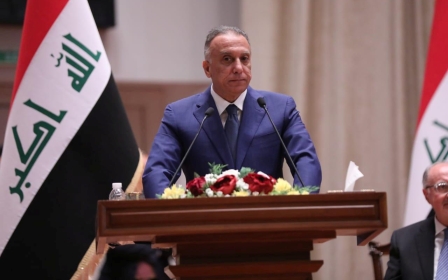Iraq and US affirm commitment to American troop withdrawal

Iraq and the United States have affirmed their commitment to the withdrawal of US troops from Iraq without giving a timeline, state news agency INA said on Friday, citing Iraq's Prime Minister Mustafa al-Kadhimi.
Iraq's parliament had voted earlier this year for the departure of foreign troops from Iraq, and US and other coalition troops have been leaving as art of a drawdown.
Kadhimi said the US-Iraq Strategic Dialogue recognised the Iraqi parliament's decision on the US withdrawal, INA reported with no further details.
It was unclear whether that would include military trainers which most parties, including some backed by regional heavyweight Iran, have said would be acceptable to remain in Iraq, Reuters reported.
In a joint statement on the US-Iraq Strategic Dialogue, Washington said it would continue reducing forces and discuss with the Iraqi government the status of the remaining forces, stressing it does not seek permanent bases or a permanent military presence in Iraq.
The United States also discussed providing economic advisors to work directly with the Iraqi government to help advance international support for Iraq’s reform efforts, in light of the consequences of the coronavirus pandemic and the decline in oil prices, the joint statement added.
Permanent bases not sought
Regional tensions skyrocketed following a US strike on Baghdad in January that killed Iranian general Qassem Soleimani and Iraqi militia commander Abu Mahdi al-Muhandis, with lawmakers in Baghdad demanding the expulsion of the roughly 5,200 US troops in the country.
US President Donald Trump responded by threatening crippling sanctions and, according to US military sources, Washington began planning a vast bombing spree against groups blamed for the rockets.
In the joint statement, the US said that the reason for its military's return to Iraq in 2014 - to defeat Islamic State - had made major headway.
"The two countries recognized that in light of significant progress towards eliminating the ISIS (Islamic State) threat, over the coming months the US would continue reducing forces from Iraq," a joint statement said.
"The United States reiterated that it does not seek nor request permanent bases or a permanent military presence in Iraq."
The coalition has already consolidated to just three bases in recent months, down from a dozen.
The joint statement, hashed out ahead of time, did not give figures and Thursday's dialogue was brief, with David Schenker, the top US diplomat for the Middle East, telling reporters the delegations did not discuss a timeline for reducing troops.
Due to coronavirus travel restrictions, top-level talks expected to take place in Baghdad were demoted to a brief online kick-off session.
New tone
Tensions have calmed substantially since Kadhemi, a former Iraq i spy chief with close ties to the US and its allies in the region, took the reins as Iraq's premier last month.
Two Iraqi officials said Kadhemi has been invited to the White House this year, a diplomatic olive branch his predecessor Adel Abdel Mahdi had never received.
"There was a lack of confidence in the relationship with the previous government," one of the officials told AFP.
Iraq in the joint statement promised to protect US bases that have seen a barrage of rocket fire blamed on paramilitary groups tied to Iran, a major adversary for the Trump administration.
Iraq's economy relies almost exclusively on oil exports, with faltering prices and low demand drastically shrinking the government's ability to pay wages, pensions and welfare to eight million Iraqis.
After Kadhemi took charge, the US extended a waiver from American sanctions to let Iraq keep importing needed gas from Iran, although the exemption runs out in September.
Middle East Eye delivers independent and unrivalled coverage and analysis of the Middle East, North Africa and beyond. To learn more about republishing this content and the associated fees, please fill out this form. More about MEE can be found here.





